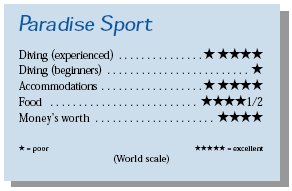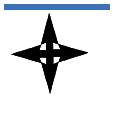Mike Ball's New Paradise SportContents of this Issue: Seeking Revenge on Tiger Sharks A Cautionary Note On Ascent Rates Mike Ball's New Paradise Sport While in PNG, Forget Port Moresby Editorial Office: Ben Davison Publisher and Editor Undercurrent 3020 Bridgeway, Suite 102 Sausalito, CA 94965 Checking out the Muck in New Guinea from the October, 1998 issue of Undercurrent
Make no mistake: the waters of Papua New Guinea offer the proverbial "once-in-alifetime" experience. I know. I've made two "once-in-a-lifetime" trips to PNG and hope to make more. For this trip, I chose Mike Ball's newly-built, twin-hulled, burnished aluminum beauty, the Paradise Sport. Although the Paradise was departing at this time from Alotau and the crew was collecting lists of lots of little things that needed refitting when she headed back for her home port in Townsville, Australia, I would be nit-picking to report on anything about the ship that caused the least hassle. The large and luxurious staterooms are individually air-conditioned, a private shower has unlimited hot and cold water, and there are always fresh, clean towels. Two of the "suites" not only have king beds but also tv monitors so you can watch whatever is in the tape deck upstairs in the lounge or, if you choose, plug and play your own dive videos before everybody else starts yelling to see the octopi you captured mating in mid-water. The Paradise has GPS navigation and satellite uplink for Internet services (e-mail, for example) or cell phone service from anywhere on the high seas! The food was a definite draw, with five meals a day--most of which scored tens, or at least a 9+. Everything was excellent with lots of fresh fruits and veges and cookie and cake snacks served all day. Breakfasts were generally high-carbo meals such as pancakes, toasts, eggs if desired, bowls of fruit salad, Aussie bacon, and occasionally frittatas or fish. Lunches usually featured three to five dishes such as fajitas, spiced and sauced fish, pork stirfry, and a big salad bowl daily. Dinners, with four to five main dishes, were the great meal. Fish, often fresh tuna, might be served both grilled and in a lime sauce along with well-barbecued steaks, plenty of wine, good music, and great company. Every aspect of the Mike Ball Diving Program is carefully thought out and executed (too well thought out, in one case: at the end of the trip they told us we "must" fill out a marketing questionnaire for Mike Ball's benefit, which offended many onboard). Our director of dive ops, Wayne Fox, was in charge of virtually everything from drawing divesite briefings to monitoring Nitrox fills to overseeing profiles of those who like long bottom times. Ball has a "Solo Diver Program" available after a checkout, waiver, and "swear-to-God-strapped-on-pony-bottle." Then those of you who like being alone with the sharks can get all the adrenaline you want! The dive deck for giant strides, ladder/ platform entries, or Zodiac rides is sizable and well-equipped. They meticulously govern the Nitrox and straight-air operations so that you'd barely notice they served both brands at the pumps. The crew onboard during my trip, especially Wayne, Steven, and Junior, deserve special mention for making life easy. Slipping out of port at Alotau (Gurney is the local airstrip), we headed off for seven days of diving and cultural wonders. Milne Bay has more islands per measure than any other region of PNG, giving us deep blue vertical walls, lagoons, coral heads and bommies, current dives with lots of sharks, secure coves for night dives, and some sites with nearly all types of diving within the secure zone of the ship. We even got to dive on a well-preserved B-17 bomber in about 150 fsw. The captain had ditched the "Black Jack" on the reef off a small village near Keast Reef after returning from a bombing run. The islanders rescued the crew of ten, and the Aussies picked them up a day or two later. We visited the village and spoke to several men who had taken part in the 1945 rescue. The bomber, however, was merely great--which meant that it wasn't the best of our diving by a long shot. Right off we hit Banana Bommie, with incredible numbers and types of hard and soft coral and massive schools of baitfish, schools of tuna, mackerel, bumpheaded parrot fish, and pink, blue, and yellow pointed-nosed parrot fish. I saw a black nudibranch with vivid, internally-lit blue dayglo decorations. Then it was on to Sponge Wall, where huge
red and black Spanish Dancers, with a little
encouragement, danced an open-water flamenco, skirts undulating to the beat of silent
music. The next stop was "Humann's Color
Book," which, oddly, I found to be without
interest, but Cecilia's Reef provided a
thrilling dive. I'm typically a wall diver, and absolutely not a photographer. So the notion of "muck diving" at Lawadi (or Dinah's Reef) in less than 50 feet of water was nothing I looked forward to--until I discovered huge mating octopi; all colors of mantis shrimp; blue ribbon eels; giant anemones rising out of the sand at night, looking like Stephen King creatures with golden arms; female cuttle fish displaying outrageous colors; ghost pipe fish; demon scorpions; lion fish; sea horses; many frog fish: yup, it ranked among my most exotic dives ever. Village folks here were roasting pigs and dogs for a funeral right at our stern, leading to morbid and self-protective joking, but it didn't dim anyone's enthusiasm for the diving. At Observation Point, the dive ops manager knew the homes of all the exotic residents of this little bay: large mantis shrimp pushing rubble out of their holes, sand anemones with anemone fish and bizarre, transparent green anemone shrimp dancing around their edges, bulldozer shrimp clearing endless rubble from their lairs while their sentinel shrimp Gobi stood by like military guards, guaranteeing the safety of the country. One 'dozer even had two symmetrical shrimp Gobi soldiers, shoulders high and eyes darting everywhere, simultaneously looking for trouble that never erupted. Residents of a small nearby village camped next to our ship from our afternoon arrival to our morning departure. At night, small fires blazed up along the shore, in contrast to the safety lights illuminating our giant canoe. From little boys to old men to mothers and young girls, we were surrounded by a constantly changing flotilla of outriggers--some folks just curious, some doing business--while boys free-dived in the shallow water to watch us overdressed, overteched dive monsters take so seriously our pursuit of the strangest collection of tropical ocean animals anyone aboard had ever seen in one place. -- E. M.
|

I want to get all the stories! Tell me how I can become an Undercurrent Online Member and get online access to all the articles of Undercurrent as well as thousands of first hand reports on dive operations world-wide
| Home | Online Members Area | My Account |
Login
|
Join
|
| Travel Index |
Dive Resort & Liveaboard Reviews
|
Featured Reports
|
Recent
Issues
|
Back Issues
|
|
Dive Gear
Index
|
Health/Safety Index
|
Environment & Misc.
Index
|
Seasonal Planner
|
Blogs
|
Free Articles
|
Book Picks
|
News
|
|
Special Offers
|
RSS
|
FAQ
|
About Us
|
Contact Us
|
Links
|
3020 Bridgeway, Ste 102, Sausalito, Ca 94965
All rights reserved.

 At dusk, I went straight
to the point of the bommie where the current
is strongest and watched the reef
explode with life. No matter how Zen my
buddy and I might have been, the swirling
thousands of synchronized creatures
streaming in every conceivable direction
got us twirling, tumbling, laughing into
our regulators, and gradually experiencing
creeping euphoria--and all at a mere 30
fsw. Clown-like surgeon fish chasing each other in mating circles, rivers of bonito-like
silver slivers about a foot long, chevron barracuda by the dozens, mean trevally out for
dinner, rainbow runners and fusiliers--the vast assemblage overwhelmed me.
At dusk, I went straight
to the point of the bommie where the current
is strongest and watched the reef
explode with life. No matter how Zen my
buddy and I might have been, the swirling
thousands of synchronized creatures
streaming in every conceivable direction
got us twirling, tumbling, laughing into
our regulators, and gradually experiencing
creeping euphoria--and all at a mere 30
fsw. Clown-like surgeon fish chasing each other in mating circles, rivers of bonito-like
silver slivers about a foot long, chevron barracuda by the dozens, mean trevally out for
dinner, rainbow runners and fusiliers--the vast assemblage overwhelmed me.  Diver's Compass: I booked through Adventure Express, 800-442-0289 or
contact Mike Ball direct at 800-952-4319/520-556-9590...10-day trips
run from $2150 to $3350 . . .the Paradise Sport offers full repair
facilities, world-class photo and video shop, gear, computer, and
camera/video rentals, daily E-6 slide processing, and onboard PADI
Nitrox course...easy checkout dive, c-cards checked...except for
planned aircraft wreck dive at 150' we planned our own profiles...
dives were recorded by the crew after surfacing...tanks were aluminum
80s...malaria is still prevalent in the area...air temperatures in March/April were
85-92°F., water 82-86°F...beer and drinks were available for $2-3 Australian, free wine
with meals...lounge features a well-stocked library.
Diver's Compass: I booked through Adventure Express, 800-442-0289 or
contact Mike Ball direct at 800-952-4319/520-556-9590...10-day trips
run from $2150 to $3350 . . .the Paradise Sport offers full repair
facilities, world-class photo and video shop, gear, computer, and
camera/video rentals, daily E-6 slide processing, and onboard PADI
Nitrox course...easy checkout dive, c-cards checked...except for
planned aircraft wreck dive at 150' we planned our own profiles...
dives were recorded by the crew after surfacing...tanks were aluminum
80s...malaria is still prevalent in the area...air temperatures in March/April were
85-92°F., water 82-86°F...beer and drinks were available for $2-3 Australian, free wine
with meals...lounge features a well-stocked library.